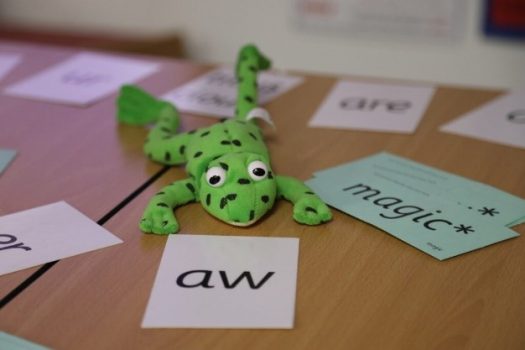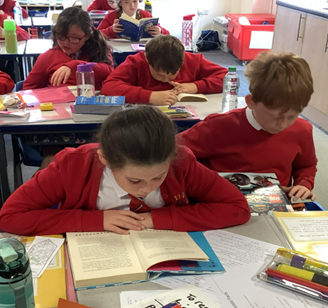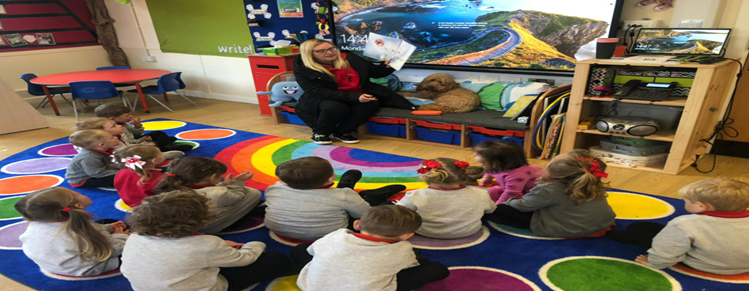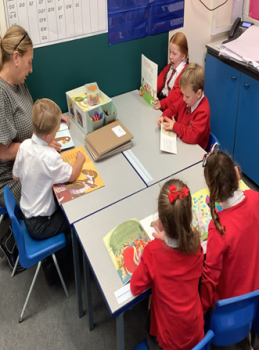Reading
Approach to Reading
At St Leo’s and Southmead Catholic Primary, we aim to develop a love and appreciation of reading which will stay with children for life. Through a range of carefully planned lessons, children learn to become fluent readers, drawing on a range of reading strategies they have been taught during Phonics sessions, whole class and small group guided reading sessions. Children in EYFS and Key Stage 1 receive daily 40 minute Phonics sessions, based on the Read, Write Inc. scheme, where they learn the graphemes, digraphs and trigraphs in order to decode words, providing the basis for reading. Children in Key Stage Two and those who have completed the Read Write Inc Programme take part in daily whole class reading sessions , where specific techniques are taught, following a whole school structure to support children with inference and deduction, as well as vocabulary and the author’s intent. In addition children read with an adult once a week, with specific feedback given to ensure that further practise at home builds on this learning. Children needing additional support are read with daily to help them to make accelerated progress. Fluent reading is constantly modelled to the children through shared reading within English lessons and throughout the curriculum, as well as developing a love for reading through class stories, novels and poems.
Reading across the curriculum
Reading is at the heart of everything we do at St Leo’s and Southmead Catholic Primary. It is not restricted to English lessons and the children begin to make the transition from learning to read, to reading to learn as they progress up the school. Topics are based around quality texts, and these are available for children to explore and share within each class.
Reading in Nursery
In Nursery, the main focus will be learning effective communication. The children will take part in a range of activities to support their listening and attention, understanding and speaking. The children will learn to categorise and name objects and understand the purpose for items, such as scissors are used to cut, a fork is used to eat with.
Children will be read lots of stories by adults within the class in order to hear and learn repetitive story language. They will be encouraged to join in with the repeated sections of the text and will begin to retell these verbally.
During the Summer term, children will be given an individual reading book. This will be a wordless story to encourage the children to talk about what they see is happening in the pictures, sequence the
story, what they think the characters might say and what might happen next.
Reading in Reception

The children in Reception are taught a range of skills for reading, building this into reading full stories with limited support.
They are taught to:
- Retell the story using pictures
- Point to the words on the page and say the sentence after the adult, understanding that text has meaning
- Sound out individual words and blend them together
- Begin to read words and simple sentences
- Read sentences fluently and talk about what they have read
- Recognise key words on sight, such as the, to, go etc.
To support their reading, the children have daily Phonics lessons, where they are taught the individual sounds and their corresponding letters; twice weekly guided reading sessions where they read as part of a small group, learning a range of reading strategies; and whole class guided reading sessions in the summer term.
Every child takes home an individual reading book and children are read with on a weekly basis. Any children needing additional support are read with daily to ensure they make accelerated progress.
Reading in KS1
The children are supported in their reading journey through:
- Daily Phonics sessions for all Year 1 children and for Year 2 children until the complete the Read Write inc programme
- Weekly small group adult led guided reading sessions (Year 1 grouped by ability and Year 2 in mixed ability groupings)
- Twice weekly whole class guided reading sessions where a text is shared and discussed with the whole class
- Weekly vocabulary sessions
- Weekly small group adult led comprehension reading sessions (Year 1 from the summer term)
- All children take home three reading books and are read with on an individual basis at least once per week. Any children needing additional support are read with on a daily basis.
Reading in Key Stage 2
The children continue to learn key strategies for retrieval, inference and deduction through:
- Daily whole class reading sessions where a text is shared and discussed with the whole class
- Weekly vocabulary sessions
All children take home reading books and are read with on an individual basis once per week. Any children needing additional support are read with on a daily basis. Children are encouraged to take responsibility for their own reading, changing their book when needed.
Developing a love of Reading
We are committed to engaging children in reading through exciting opportunities within school. All children are read to by an adult each day, in the form of a class story, novel or poem, as well as further opportunities throughout the week during lessons. Author days, World Book day and Storytelling week are other additional opportunities for children to be enthused with reading.
How will children be assessed?
During small group guided reading sessions, children are assessed against the learning objectives for that lesson based on the National Curriculum objectives for their year group. These build up to provide a wider picture of your child in order to ensure progress. The children also complete the NFER reading assessment each term, to ensure they are reading the correct book band and to ensure progress throughout the year. In key stage 2, the children complete termly comprehensions based on the Salford Reading Test. Targets are then set for individual children, using these assessments, as well as the teacher’s knowledge of your child. Summative assessments are also completed each term in the form of SATs or the NFER Assessments for children from Y1 onwards.
Key Documents
Reading for Pleasure at St Leo’s and Southmead Catholic Primary School
St Leo’s and Southmead Progression in Reading
St Leo’s and Southmead Catholic Primary Reading Spine
Resources to help Parents to support Reading at Home
- 50 recommended reads for Nursery
- 50 recommended reads for Reception
- 50 recommended reads for Year One
- 50 Recommended reads for Year Two
- 50 recommended reads for Year Three
- 50 recommended reads for Year Four
- 50 recommended reads for Year Five
- 50 recommended reads for Year Six
- Ideas for how to record your child’s progress in reading at home within their reading records
- Interactive Storytime for children aged 3-5
- Interactive Storytime for children aged between 5 and 7
- Interactive storytime online for children aged 7 -9
- Interactive storytime online for ages-9-11
- Year One and Year Two Reading Challenge
- Year 3 and 4 Reading Challenge
- Year 5 and 6 Reading Challenge
- Oxford reading-buddy-letter-to-parents
- Oxford Reading Buddy guide 4 parents



